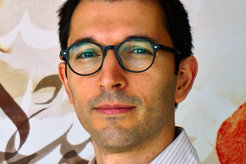New Director: Iyad Rahwan’s Research Focuses on the Societal Challenges of Digitization
The interaction between humans and machines
Algorithms are on the rise as actors changing our social coexistence. How do individuals and entire societies deal with them? How can the community organize the development of the interplay between humans and machines in the digitization era in accordance to its values? How can the potentials of artificial intelligence and machine learning be used to benefit the individual and society? How should educational and work-related processes be shaped in the context of virtual institutions? The new Center for Humans and Machines at the Max Planck Institute for Human Development in Berlin will work on these topics. It will be headed by Iyad Rahwan, who spent the last four years running a lab at the Massachusetts Institute of Technology (MIT) in Cambridge (USA).

Every day algorithms make millions of decisions affecting our lives. They determine which news we are shown in social media. They choose the products that are displayed for us in the internet. They analyze our habits and adapt their offers accordingly.
Algorithms can not only predict preferences and behaviors, they can even change them—and without us even noticing. In many cases, such as product recommendations—“Customers who bought this product also viewed these”—, this may seem harmless or even practical. But when algorithms determine who is offered a job, gets a visa, or is put into jail, they become powerful societal institutions that influence individual lives and reorder society.
“I am interested in how machines, regardless of their intelligence levels, can work for us without manipulating or harming us,” says Iyad Rahwan, Director of the Center for Humans and Machines at the Max Planck Institute for Human Development. “To do research on this, we need a dialogue between my own discipline, computing and information science, and the social and behavioral sciences.”
The best known example of Iyad Rahwan’s previous research is on moral dilemmas in the context of autonomous cars. The focus is on the way an autonomous car ought to react in a dangerous situation. For example, should the algorithm be programmed to endanger a child crossing the road at a red light more than the car driver? Questions like this involve psychological, political, and sociological aspects. Who defines the values according to which the car’s algorithm decides—the driver, the car manufacturer, or society at large?
“We were very pleased about our colleague’s decision to move from MIT to our institute,” says Ulman Lindenberger, Managing Director of the Max Planck Institute for Human Development. “Digitization poses new developmental tasks for the individual as well as society. Iyad Rahwan’s research frames the conditions for their mastery.”
“Information technologies can contribute to the welfare and prosperity of society. However, they can also compromise people’s decision-making capacities and restrict their freedom of action—potentially with catastrophic consequences. We should therefore discuss and negotiate the rules of algorithm utilization,” says Iyad Rahwan. “We are in the process of drawing up a new social contract that takes account of the effects of digitization.”
Further Information
Iyad Rahwan studied informatics at UAE University in Abu Dhabi as well as information technology at Swinburne University and the University of Melbourne, where he completed his PhD in 2005. He was then Lecturer and Senior Lecturer for Informatics at the British University in Dubai. In 2010, he became an Associate Professor of Computing and Information Science at the Masdar Institute of Science and Technology in Abu Dhabi. He became an Associate Professor of Media Arts & Science at the Media Lab of Massachusetts Institute of Technology (MIT) in Cambridge since 2015.












